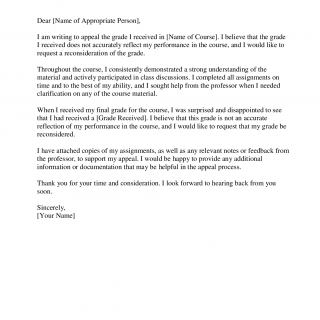Student Appeal Letter
A Comprehensive Guide to Writing an Effective Appeal
A student appeal letter is a written correspondence that a student submits to address various academic matters, such as grades, disciplinary actions, financial aid, or admission decisions. The main purpose of the letter is to advocate for the student's rights and interests within an educational institution.
Parts of a Student Appeal Letter:
- Introduction: The letter should start with a clear and concise statement of the issue being appealed and the reason for the appeal.
- Supporting Evidence or Arguments: The letter should present supporting evidence or arguments to back up the appeal. This may include relevant facts, documentation, or witness statements.
- Request for Reconsideration: The letter should conclude with a request for a reconsideration of the decision or a fair resolution.
Important Fields to Consider:
- Purpose: The purpose of the letter is to advocate for the student's rights and interests within an educational institution.
- Parties: The parties involved in the appeal are the student and the educational institution.
- Data Required: The student will need to provide relevant information, such as their name, student ID number, and the specific issue being appealed.
Additional Documents: The student may need to attach additional documents to support their appeal, such as transcripts, letters of recommendation, or medical records.
Sample of Student Appeal Letter
Dear [Name of Appropriate Person],
I am writing to appeal the grade I received in [Name of Course]. I believe that the grade I received does not accurately reflect my performance in the course, and I would like to request a reconsideration of the grade.
Throughout the course, I consistently demonstrated a strong understanding of the material and actively participated in class discussions. I completed all assignments on time and to the best of my ability, and I sought help from the professor when I needed clarification on any of the course material.
When I received my final grade for the course, I was surprised and disappointed to see that I had received a [Grade Received]. I believe that this grade is not an accurate reflection of my performance in the course, and I would like to request that my grade be reconsidered.
I have attached copies of my assignments, as well as any relevant notes or feedback from the professor, to support my appeal. I would be happy to provide any additional information or documentation that may be helpful in the appeal process.
Thank you for your time and consideration. I look forward to hearing back from you soon.
Sincerely,
[Your Name]
Strengths:
- Provides a formal and structured way for students to appeal academic decisions.
- Allows students to advocate for their rights and interests within an educational institution.
Weaknesses:
- May be time-consuming and require a significant amount of effort to prepare.
- May not always result in a favorable outcome for the student.
Opportunities:
- Provides an opportunity for students to have their voices heard and to seek a fair resolution to academic issues.
- Can help students develop important communication and advocacy skills.
Threats:
- If not written effectively, the letter may not be taken seriously by the educational institution.
- The appeal process may be limited or unavailable in some educational institutions.
Application Examples and Practice:
- Appealing a grade that the student believes was unfairly assigned.
- Appealing a disciplinary action that the student believes was unjustified.
- Appealing a financial aid decision that the student believes was incorrect.
- Appealing an admission decision that the student believes was unfair.
Related and Alternative Forms:
- Grievance Form: A formal form used to file a complaint or grievance with an educational institution.
- Petition Form: A formal form used to request a change or action from an educational institution.
A student appeal letter is a written correspondence that is typically more detailed and personalized than a formal form. A student appeal letter allows the student to present their case in their own words and to provide supporting evidence or arguments.
A successful appeal can result in a favorable outcome for the student, such as a grade change, disciplinary action reversal, or financial aid award. An unsuccessful appeal may result in no change to the original decision.
The letter should be submitted to the appropriate office or individual within the educational institution. The letter should be stored in a safe and secure location for future reference.

